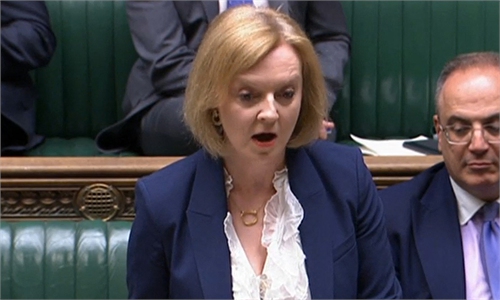
Illustration: Liu Rui/GT
Since Liz Truss became the prime minister of Britain one and half months ago, Downing Street's ability to maintain financial market stability has been severely crippled. Facing elevated oil and gas prices, a struggling economy and runaway inflation, any drastic policy alteration by Truss could easily spark a financial tsunami and sink UK to new lows after the self-inflicted crater resulting from the exit from EU.On Monday, a tumultuous sell-off in UK government bonds pushed the country's long-term borrowing costs to their highest level, since the Bank of England, the country's central bank, intervened to avert a financial market collapse. The 30-year government bond yield jumped 0.29 percentage points to 4.68 percent on Monday. The bond market has been unsettled since the government announced large unfunded tax cuts in September.
At the same time, the pound plunged in value against the US dollar, the euro and other currencies, because market investors were spooked and annoyed by the Truss-led cabinet's "mini-budget" that focuses on sizable tax cuts and deregulation. Under mounting political and financial pressure, Truss made a U-turn, by scrapping the most unpopular part of the budget package - a tax cut on earnings above 150,000 pounds a year which critics claim benefits UK's rich people at the expense of ordinary wage-earners and the poor.
To prop up the worsening bond market and halt a wider economic meltdown in UK, the Bank of England will be forced to reverse its policy of tightening, needed to tamp down trenched high inflation, by purchasing more UK government bonds from the market. Whether the central bank could woo the investors back and upend the precariousness of the capital market, the jury is still out.
And there is more bad news for Truss. Within the Conservative Party, political infighting and rebellion seems to intensify. Many in the ruling party are now in a glum mood as Tory members of the parliament are increasingly concerned about losing their own jobs. Opinion polls are becoming increasingly dire each passing day, as the Tory lawmakers fear the party is doomed to lose the next national election under the watch of Truss. The opposition Labor Party is far ahead in polls by leading 30-38 percentage points.
Truss's chaotic month in power has deepened the sense of political instability, shocking investors in UK and raising serious questions about her ability to manage the anemic economy. Truss' first big policy, a stimulus package that includes 45 billion pounds in tax cuts to be paid by government borrowing, alarmed and jolted financial markets when it was announced on September 23.
The UK's central bank is also unhappy with Truss cabinet's inexperience and recklessness in upsetting the financial market with poorly crafted budget proposals. The Bank of England was forced to launch its initial foray into markets on September 28 when it offered to buy up to 5 billion pounds of long-term government bonds in order to buttress the country's rapidly sinking pension funds, which hold large positions in derivative-based investments that were battered by a furious sell-off in government bonds. UK bonds were hammered in the aftermath of Truss' surprise "mini-budget".
Facing 40-year high inflation, the Bank of England, like the US Federal Reserve and the European Central Bank, is supposed to be tightening policy by reining in lending. But since September 24, it was forced to loosen its policy by purchasing tens of billions of pounds of government bonds. It is true that many Bank of England officials are confused about what they are doing now. If this was a lender-of-last-resort operation for the central bank to provide liquidity and ensure smooth market functioning, will it work? Nobody knows the answer.
In the foreseeable future, the UK's financial market turmoil is likely to continued unabated, if not deteriorate or worsen. Truss and her cabinet have to take the blame.
Ever since Truss' government announced the plan of the biggest tax cuts in 50 years on September 23, it backfired almost immediately. Rattled investors have raced to dump government bonds as they worry about the extra 70 billion pounds in government borrowing due before April 2023. Meanwhile, the pound fell to its lowest point in more than 35 years, at one point reaching near parity with the US dollar.
A falling pound is bad news for an economy that may already be in recession, as it makes it more expensive to import essential goods, like food and fuel, which could fan decades-high inflation that's stoking a cost-of-living crisis for tens of millions of Britons.
Truss campaigned for becoming UK prime minister this summer on a pledge to jumpstart the British economy with a supply-side revolution program. But the largest tax cuts in 50 years, contained in her "mini budget", has turned out to be an explosive device that helped detonate pension funds and the bond market. Britons and investors are now on tenterhooks.
Britain has been heavily dependent on its financial sector, which gradually lose its luster since the Brexit in early 2020. Unlike Germany, France and Italy which own fairly strong manufacturing industries, Britain's economic prospect will be dimmer, if it swirls into a deeper financial or fiscal crisis.
The author is an editor with the Global Times. bizopinion@globaltimes.com.cn

